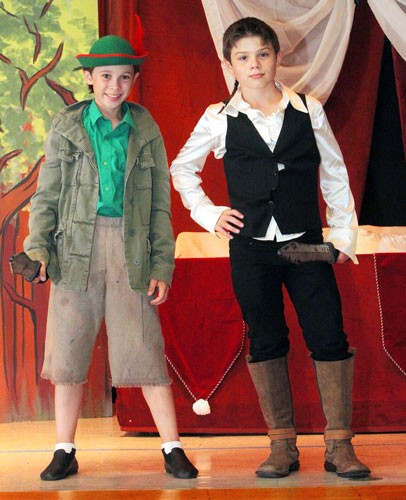Sherwood Forest and a band of merry men made an appearance in Gravesend last weekend.
Act Out! Acting School debuted its version of “Robin Hood” — with a modern-day twist — at the Block Institute on Bay 44th street on Aug. 22.
“It’s always been one of my favorite stories, and it feels especially poignant this year, with the thief Robin coming back from fighting a holy war abroad to a land wrecked by class warfare and the poor being marginalized,” said Act Out! artistic director John Stillwagon. “It seems incredibility timely.”
Act Out! is a youth camp that aims to give participants a full taste of theatre life — from building sets to costume design, in addition to acting on stage.
The play was the culmination of an 11-day intensive summer program, and was performed by kids and adults from around Gravesend and Bay Ridge.
The kids acted beyond their years, according to Stillwagon, who works with a theatre troupe during the school year.
“These kids honestly pull off things that adults can’t pull off, and I’ve done national tours, Off Broadway plays,” Stillwagon said. “It’s a good thing that they don’t quite know their limits, as sometimes adults know what they’re capable of a little bit too well. Kids push themselves to surpass their limits, and can grow up with that can-do spirit.”
He also hopes the kids, ages three to 18, took a little more out of the experience than acting skills.
“I tell them, ‘imagine what it would be like to sleep out in the cold like the poor that Robin Hood is stealing for. We’re all lucky. Just imagine how they might feel,’ ” Stillwagon said. “It’s one of the good things about acting — you learn how to have sympathy and empathy for people.”
The audience appreciated the new take on the story, according to Stillwagon, who said they had a record-breaking opening-night audience nearly 100 people.
Stillwagon said the Act Out! program has evolved, and returning students can learn new things and build on their experience.
“I think as the years go by, we have so many returning students that the school continues to grow and change — that the young students learn, and the old students don’t learn the same thing they did for the past few years,” Stillwagon said. “Learning new lessons, taking on new challenges. We’ve grown with the audience and the exposure.”


























